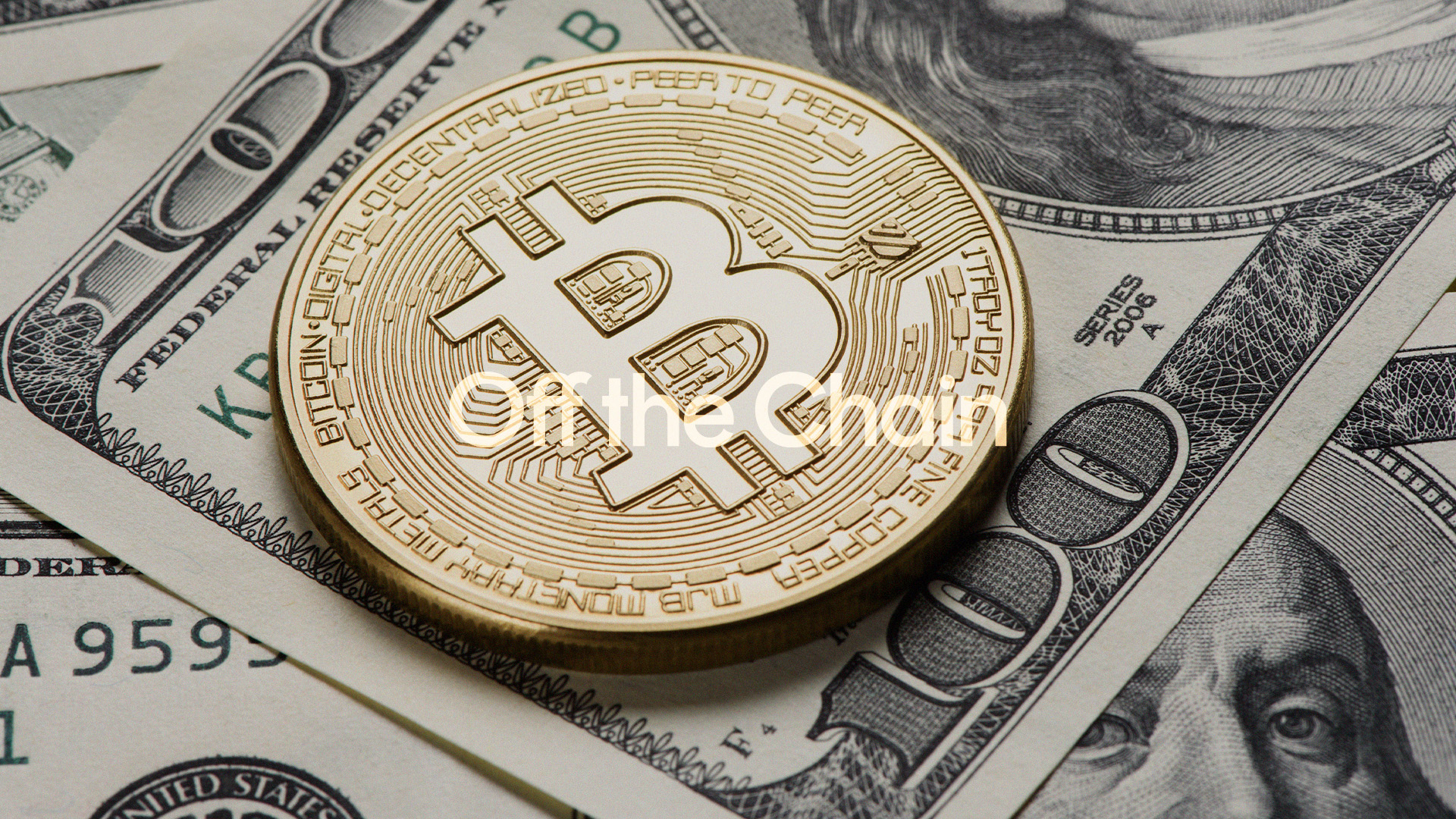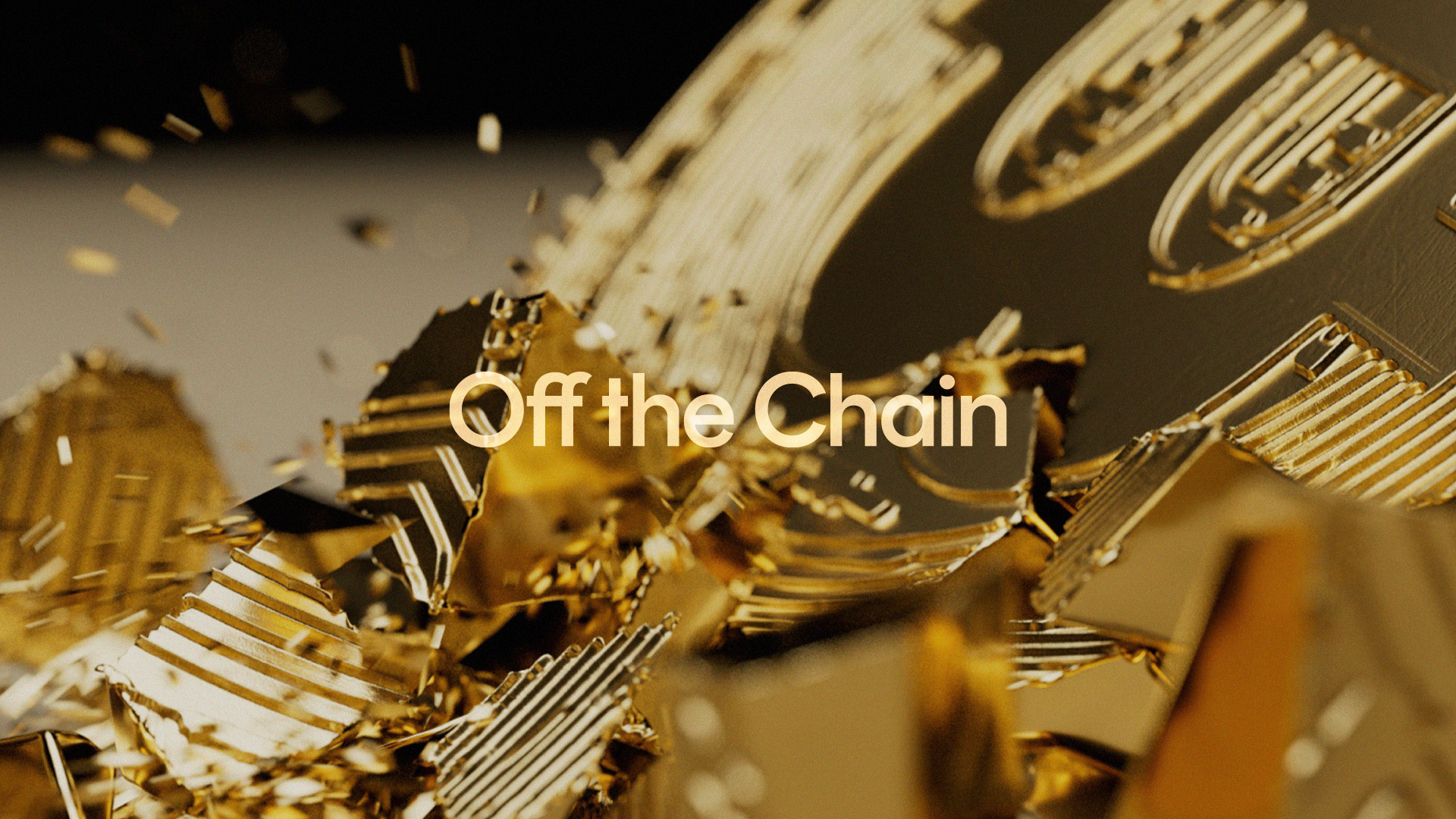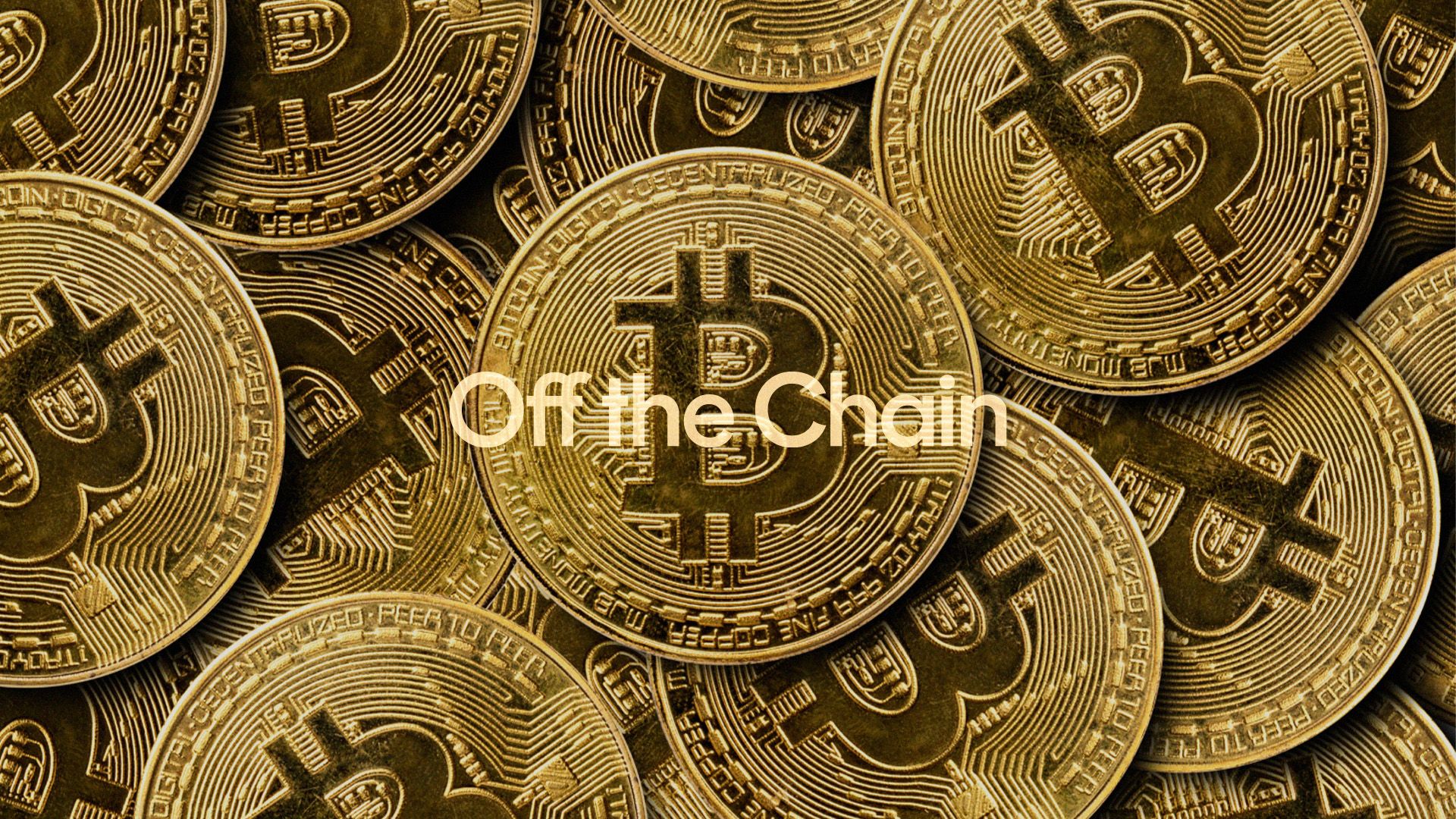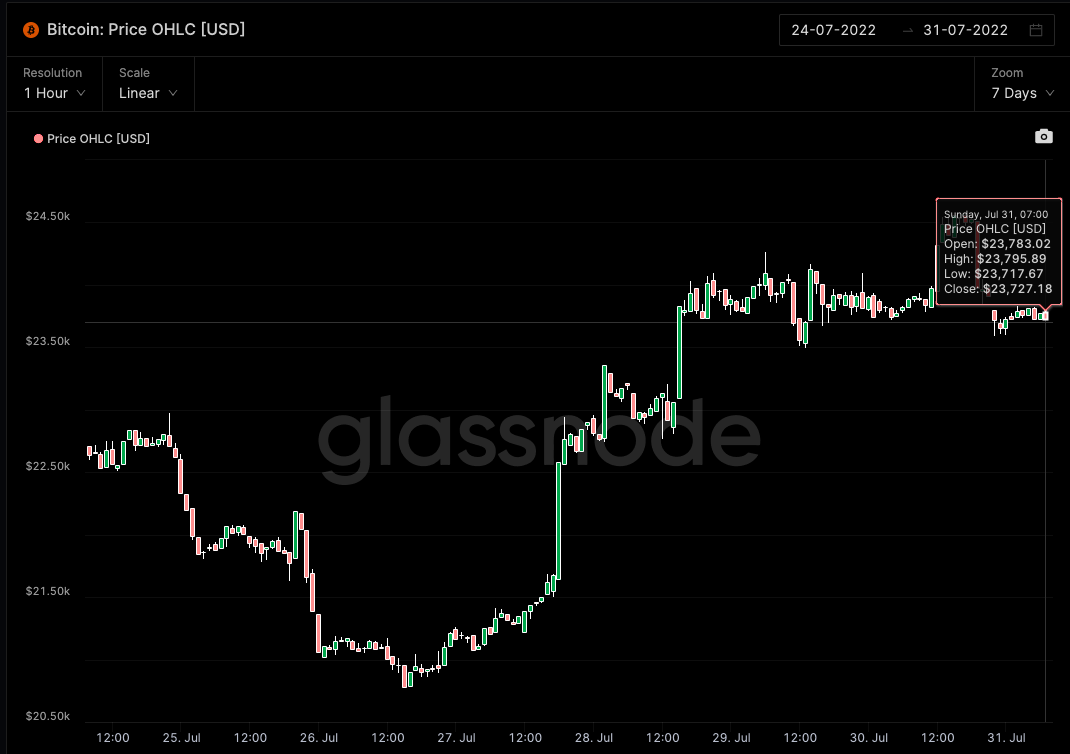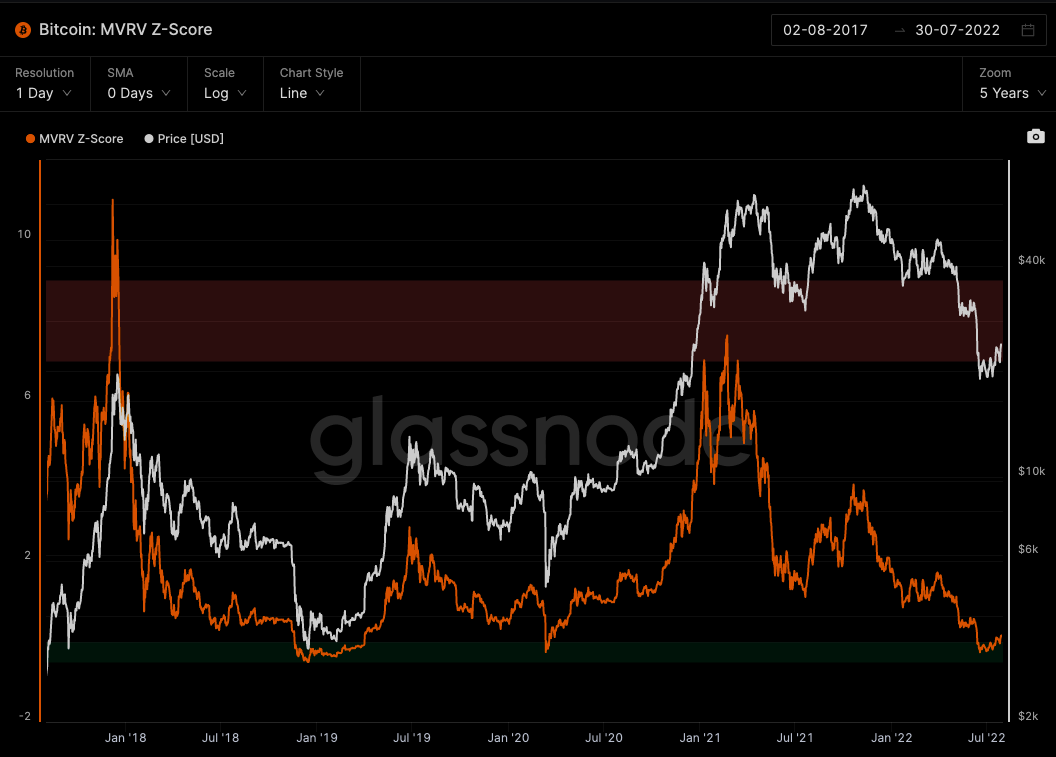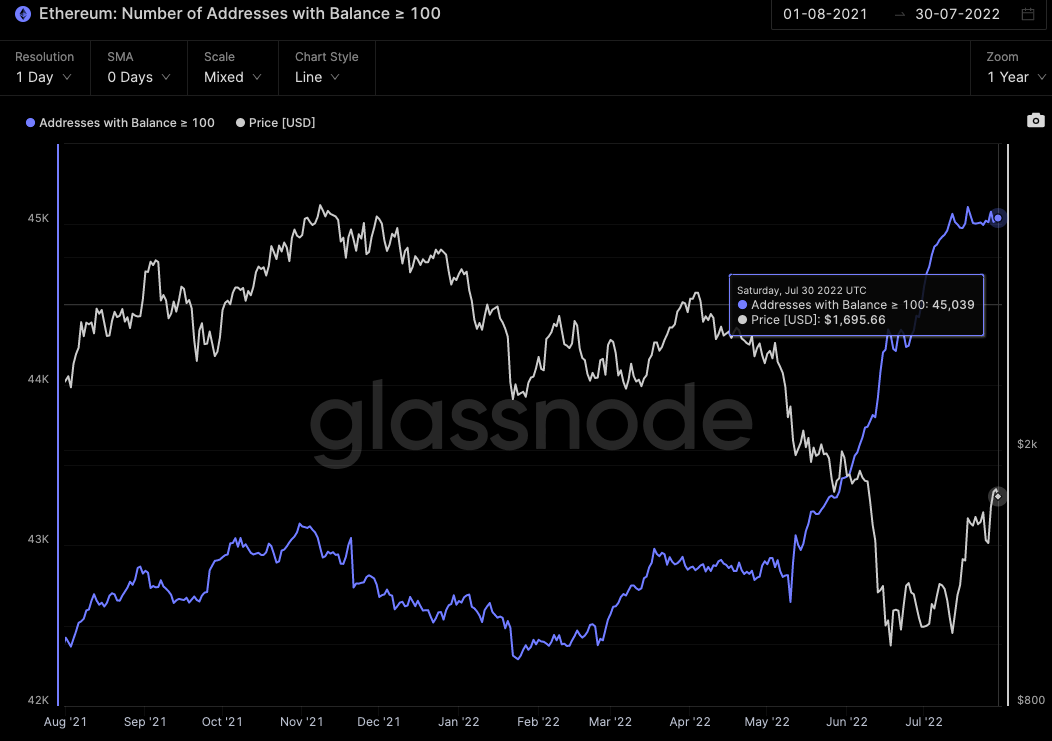Bitcoin and the rest of the crypto market enjoyed another week of gains as the Federal Reserve’s rate hike of 75 basis points matched expectations. However, crypto exchanges Coinbase and Kraken came under fire from the SEC and U.S. Treasury Department respectively, which permeated news headlines over the week.
Bitcoin hit its highest level in more than six weeks, and at the time of writing is trading at US$23,689. Ethereum continued to outperform bitcoin, up 6.14% vs bitcoin’s 4.63% for the week.
Bitcoin’s market cap increased to US$452.6B, with the total crypto market up to $1.10T. Bitcoin’s market dominance remained steady at 41.26%.
| Price | High | Low | Change from previous week | |
| BTC (in US$) | $23,689 | $24,572 | $20,776 | 4.63% |
| ETH (in US$) | $1,696 | $1,774 | $1,362 | 6.14% |
Source: CoinMarketCap. As at 31 July 2022. Past performance is not indicative of future performance. Performance is shown in US dollars and does not take into account any USD/AUD currency movements.
Source: Glassnode. Past performance is not indicative of future performance.
News we’re watching
Coinbase facing an SEC probe
Coinbase Global Inc. (COIN), one of the world’s largest crypto exchanges, is reportedly under investigation by the SEC. According to Bloomberg News citing sources familiar with the matter, the investigation is meant to determine if the company allowed Americans to trade listed cryptocurrencies that should have been considered securities. More than 150 tokens can be traded by Americans on the exchange, however if some of those tokens were deemed securities, the firm could need to register as an exchange with the SEC.1
Coinbase chief legal officer, Paul Grewal, said Coinbase will engage with the SEC on the matter: “We are confident that our rigorous diligence process — a process the SEC has already reviewed — keeps securities off our platform.” The cryptocurrency platform has previously asked the regulator to develop rules that work for digital asset securities. He also wrote in a blog that pre-dated this matter: “The SEC’s charges put a spotlight on an important problem: the US doesn’t have a clear or workable regulatory framework for digital asset securities. And instead of crafting tailored rules in an inclusive and transparent way, the SEC is relying on these types of one-off enforcement actions to try to bring all digital assets into its jurisdiction, even those assets that are not securities.”
Kraken under investigation
Kraken reportedly is under investigation by the U.S. Treasury Department for violating sanctions. A report from the New York Times stated that Kraken allegedly enabled sanctioned users in Iran and other restricted regions to continue purchasing cryptocurrencies. Following the hostage crisis at the American embassy in Tehran 1979, the U.S. imposed restrictions on activities with Iran. Citing anonymous sources affiliated with the exchange, the report states that the Treasury Department’s Office of Foreign Assets Control (OFAC) has been investigating Kraken since 2019 for allegedly allowing Iran-based users to buy and sell digital assets. The report says that Kraken will likely get fined, which will make the $11-billion private company the biggest US-based crypto firm to face enforcement action from the agency.2
When asked, a Treasury spokeswoman said the agency does not comment on potential or ongoing investigations. Similarly, Kraken’s Chief Legal Officer, Marco Santori, said the firm “does not comment on specific discussions with regulators.”
Bored Ape creators face potential class action lawsuit
Yuga Labs, the company behind the NFT collection Bored Ape Yacht Club (BAYC) may be facing a potential class action lawsuit. Lawfirm Scott + Scott alleges Yuga Labs used celebrity promoters and endorsements to artificially boost the price of the company’s NFTs (non-fungible tokens) and its native coin ApeCoin, leaving investors with deep losses. The law firm would need to prove that BAYC NFTs are securities like stocks, bonds, or options in order to be successful. Legally, anyone issuing a security has to register it with the Securities and Exchange Commission to prevent fraud. If a court finds the BAYC NFTs to be securities, then Yuga Labs would have failed to make the necessary disclosure and registration obligations that come with offering securities.3
However, Brian Fyre, a professor of law at the University of Kentucky stated: “I see very, very, very little likelihood that the SEC is going to want to step in there and characterise that [Bored Ape NFT collection] as a security. I think they’re going to resist that tooth and nail, because that would open up a huge can of worms for them and force them to regulate all manner of other things that they don’t want to be regulating.”
To date, the SEC has refrained from decisively labelling any NFT as a security. Labelling an NFT as a security would likely bring the broader art market under the SEC’s purview, something the agency has long resisted.
On-chain metrics
Bitcoin (BTC): MVRV Z-Score
The MVRV Z-Score is used to assess when Bitcoin is over/undervalued relative to its ‘fair value’. When market value is significantly higher than realised value, it has historically tended to indicate a market top (red zone), while the opposite has tended to indicate market bottoms (green zone). Technically, MVRV Z-Score is defined as the ratio between the difference between market cap and realised cap, and the standard deviation of all historical market cap data i.e. (market cap – realised cap) / standard deviation (market cap).
Looking at data from on-chain analytics company Glassnode, Standard Deviations below -1 have a history of helping to identify bottom formation. To date, it has signalled undervaluation for all bear cycle bottoms, including 2015, 2019, and the March 2020 flash crash.
The June leg down in price action has produced one of the lowest Z-Score’s value on record , suggesting a statistically extreme deviation was reached, adding fuel to the present upwards relief rally.
Source: Glassnode. Past performance is not indicative of future performance.
Ethereum (ETH): Ethereum: Number of Addresses with Balance ≥ 100
Ethereum traded below its realised price since early June, however is back above given its ~65% move higher within the last couple of weeks. In that time, wallet addresses have been accumulating, and the number of addresses holding at least 100 ETH is noticeably higher. According to the data from Glassnode, the number of addresses holding at least 100 or more ETH has increased from 42,648 back in May to 45,039 currently.
Source: Glassnode. Past performance is not indicative of future performance.
Altcoin news
In altcoin news, Q2 data reveals that Binance coin (BNB) was the best performer among top 10 cryptocurrencies. Solana (SOL) was the worst. The Binance Smart Chain network’s BNB was down 33.67% in Q2, faring better than BTC’s 42% drop which was the second best performer in the top 10. Cardano’s ADA rounded out the Top 3.4
According to the Binance website, BNB is the cryptocurrency coin that powers the BNB Chain ecosystem. As one of the world’s most popular utility tokens on the world’s largest exchange by volume, not only can you trade BNB like any other cryptocurrency, you can also use BNB in a wide range of applications and use cases. BNB finished the week higher 14.11% which made it the top performer amongst Top 10 cryptocurrencies.5
|
Investing in crypto assets or companies servicing crypto-asset markets should be considered very high risk. Exposure to crypto assets involves substantially higher risk when compared to traditional investments due to their speculative nature and the very high volatility of crypto-asset markets. Investing in crypto assets or crypto-focused companies is not suitable for all investors and should only be considered by investors who (i) fully understand their features and risks or after consulting a professional financial adviser, and (ii) who have a very high tolerance for risk and the capacity to absorb a rapid loss of some or all of their investment. Any investment in crypto assets or crypto- focused companies should only be considered as a very small component of an investor’s overall portfolio. |
1. https://www.bloomberg.com/news/articles/2022-07-26/coinbase-faces-sec-investigation-over-cryptocurrency-listings?sref=6EQWk76O
2. https://www.nytimes.com/2022/07/26/technology/kraken-crypto-iran.html
3. https://decrypt.co/105871/yuga-labs-threatened-with-possible-class-action-lawsuit
4. https://news.bitcoin.com/bnb-was-the-top-tens-best-market-performer-in-q2-bitcoin-takes-second-place-solana-performed-the-worst/
5. https://www.binance.com/en/bnb
Off the Chain will be published every Tuesday. It provides the latest news on bitcoin and the rest of the crypto market along with analysis and insights into the world of crypto.It provides general information only and is not a recommendation to invest in any crypto asset, crypto-focused company or investment product.

Written by
Justin Arzadon
Director, Adviser Services & Head of Digital Assets.
C4 Certified Bitcoin Professional (CBP) and Blockchain Council Certified Bitcoin Expert™ with over 18 years’ experience in the ETF market. Passionate about the future of money.
Read more from Justin.